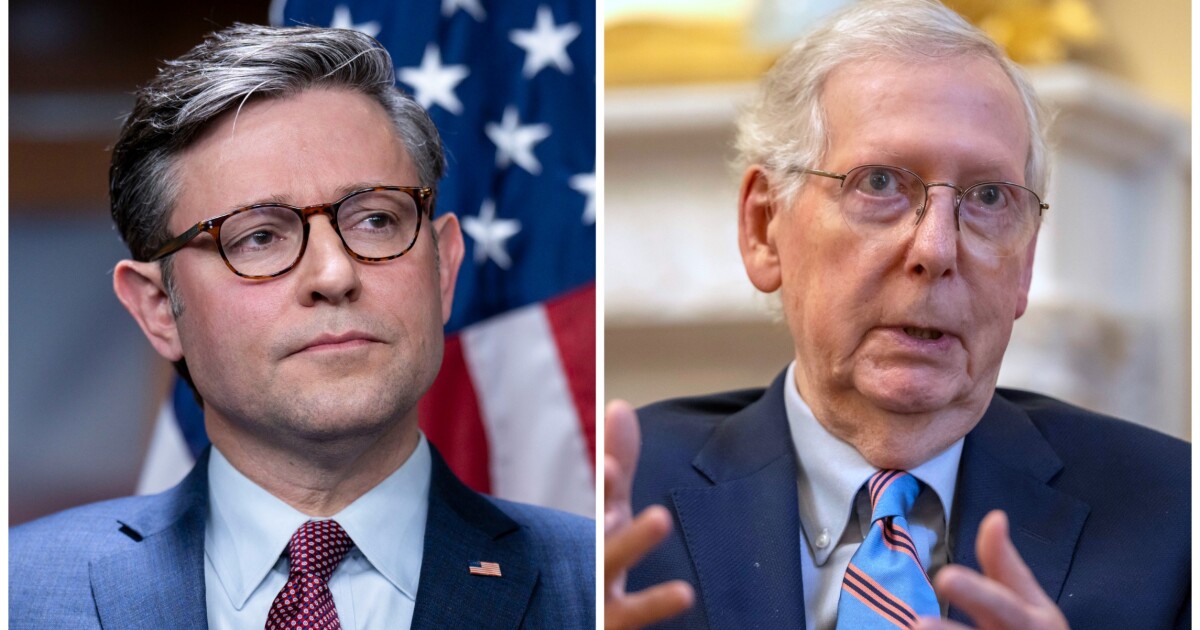

A looming government shutdown is putting House Speaker Mike Johnson (R-LA) and Senate Minority Leader Mitch McConnell‘s (R-KY) leadership to the test, as pushback from hard-line conservatives is already making the passage of a continuing resolution an uphill battle.
Johnson announced his “two-part” CR on Saturday, which would extend the Agriculture, Military Construction and Veterans Affairs, Transportation, Housing and Urban Development, and the Energy and Water appropriations bills until Jan. 19 and the remaining bills until Feb. 2. The bill does not include any aid to Ukraine or Israel and does not provide for an extension to FISA 702 authorities. However, it does provide for an extension to the expired Farm Bill provisions through September 2024.
REPUBLICANS NAVIGATE CULTURE WAR SETBACK ON ABORTION
The plan is likely to garner Democratic support in the Senate and possibly the House, as it is a clean continuing resolution. Rep. Dean Phillips (D-MN), who is running against President Joe Biden to be the Democratic presidential nominee in 2024, told NBC News on Monday that he is a “yes” on the CR and while not perfect, it’s “a whole lot better than a shutdown.”
However, the trick will be getting enough Republicans on board to pass the CR before Friday, when the government will shut down.
Six House Republicans have already come out against the CR: Reps. Chip Roy (R-TX), Bob Good (R-VA), Marjorie Taylor Greene (R-GA), Warren Davidson (R-OH), George Santos (R-NY), and Scott Perry (R-PA). If all Democrats were to vote against the CR, Johnson would need 218 Republicans to vote in favor, meaning he could only afford to lose three Republican votes if everyone is present and voting.
Johnson is facing the first real test of his leadership this week, with the same choices before him that were before former House Speaker Kevin McCarthy (R-CA). McCarthy was ousted in early October after Rep. Matt Gaetz (R-FL) filed a motion to vacate, accusing the California Republican of making a backroom deal with Democrats to avoid a government shutdown in September.
The new House speaker already faced two major blows last week after divisions within the GOP conference prevented two appropriations bills from passing: one for funding the departments of Transportation and Housing and Urban Development and the second to fund financial services and general government.
Even if the CR were to pass the House, the provisions of the CR could also be a point of contention for Senate Republicans — particularly McConnell, who has identified Israel and Ukraine aid as urgent priorities for U.S. national security. Sen. Susan Collins (R-ME) also expressed skepticism about the “laddered” CR.
“I have a lot of reservations. I don’t see how that would work, and it seems unnecessarily complex,” Collins said to the Hill. “How would you choose which programs terminate at which time? You’d have to go through the threat of shutdowns of part of government over and over again. It doesn’t seem to me to make a lot of sense.”
Some Republican senators said they would be in favor of extending funding to mid-December to give Congress a chance to wrap up annual funding bills before 2024.
“I’d like to get the work done now,” Sen. Mitt Romney (R-UT) said, adding that he’d like to pass funding for Israel and Ukraine “as soon as possible.”
It will be on McConnell and Johnson to lead their respective conferences and work together to find a bill that can pass both chambers of Congress before Friday’s deadline, which could prove difficult. However, whatever bill comes before the Senate will put McConnell in the hot seat, with several GOP senators likely to put pressure on the minority leader to back Johnson.
“We should be supporting him and not undermining him,” Sen. Ron Johnson (R-WI) said.
McConnell will face a significant leadership test to see whether he supports adding emergency aid for Israel, Ukraine, and the Indo-Pacific to the stopgap spending bill. He has been a vocal supporter of Ukraine since the country’s war with Russia began, but he has indicated to GOP colleagues that he is in favor of moving them forward separately instead of together, the latter of which is favored by Democrats.
If Johnson cannot get the votes for his laddered CR, he will likely need to rely on a bipartisan stopgap measure from McConnell and Senate Majority Leader Chuck Schumer (D-NY).
“Schumer would really be in the driver’s seat if the House does not act — if we get to Tuesday and they haven’t acted, then Johnson will have missed” the chance to seize the initiative, a GOP senator who requested anonymity said, according to a report.
CLICK HERE TO READ MORE FROM THE WASHINGTON EXAMINER
Some Senate Democrats are willing to hear Johnson out, however. Sen. Chris Murphy (D-CT) said on NBC’s Meet the Press on Sunday that Johnson’s proposal was “gimmicky” but did not dismiss it completely.
“We cannot have a government shutdown this weekend, certainly not while we’re facing these existential crises for our friends in Israel and Ukraine. I don’t like this laddered CR approach, it looks gimmicky to me, but I’m open to what the House is talking about,” Murphy said.





